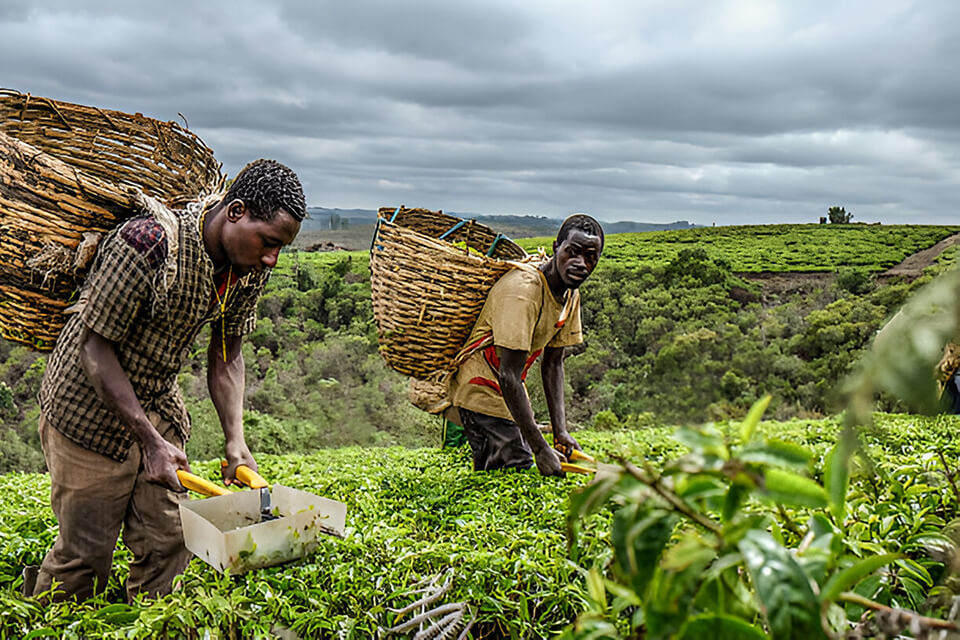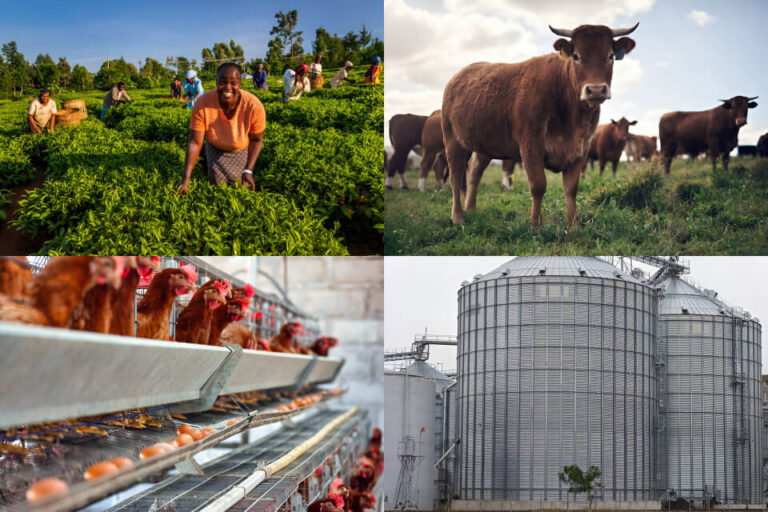Introduction
After establishing an agribusiness, the next step is putting together a team of experts that can help to manoeuvre the complexities and challenges that are peculiar to the. From unforeseen weather patterns to supply chain logistics and finances, the agribusiness industry needs resilience, adaptability, and a well-oiled machine of collaboration. But how does one put a successful agribusiness team together that thrives in dynamic environments and innovates agriculture?
Building a successful agribusiness team in Africa requires skilled and ambitious professionals who are passionate about agriculture and committed to sustainable growth. By fostering a culture of collaboration and leveraging diverse skill sets, agribusiness teams can drive increased productivity and profitability. This approach not only boosts the success of individual enterprises but also contributes to the broader transformation of Africa’s agricultural sector.
To truly make a lasting impact in the industry, agribusiness teams must focus on aligning their strategies with sustainability and innovation. Encouraging collaboration and continuous learning among team members is key to addressing the challenges and opportunities in Africa’s agricultural space. Following these principles is essential for how to build a successful agribusiness team in Africa. Here are a few tips on How to build a successful agribusiness team in Africa
Identifying Key Roles and Responsibilities in Agribusiness
Building a successful agribusiness team would first require identifying key roles and responsibilities in the business. This would ensure that daily activities, from operation to sustainability, are well managed and accounted for. Here are some of the important key roles on a well-rounded agribusiness team and how they all contribute to overall success.
Core Operational Roles
Core operational roles refer to experts in charge of the day-to-day running of the business. They are highly essential in agribusiness to ensure that daily processes run well. These key positions are crucial in managing or optimizing crop production, soil health, and efficient use of resources. They include farm managers, agronomists, production supervisors, and supply chain coordinators.
The farm manager develops the general running plan of operation, planning the crop cycles, and staff management.
- Agronomists maintain plant health, study soil science, and apply fertilizers and pesticides with alternative sustainable methods.
- Also, the production supervisors will keep daily operations in order. They ensure that standards of quality are maintained regarding products.
- In the end, the supply chain coordinator oversees the logistics section. This handles the movement of products from farm to market.
- These roles work hand-in-hand to create a productive and well-organized agribusiness.
Financial and Business Management Roles
- Making money is one of the main goals of starting a business, but doing so requires financial stability first. This does not exclude the agricultural industry. The way to achieve said financial health is by hiring a team of financial experts such as accountants, financial managers, and business strategists responsible for budget planning, watching expenses, and developing growth strategies.
- Accountants run the routine bookkeeping, overseeing cash flow, and making financial statements.
- Financial managers study economic data to project future financial performance and ensure the firm maintains its financial health.
- The business strategist formulates plans to increase productivity, scale operations economically, and implement cost-effective solutions. An agribusiness can be on firm financial footing and position itself for future growth by filling these positions.
Sales, Marketing, and Distribution
- Sales and marketing are essential to getting products into consumers’ hands and establishing brand identity. Key positions include sales managers, marketing specialists, and distribution managers.
- Sales managers retain customer relationships, negotiate contracts, and drive revenue through the sale of the product.
- Marketing professionals develop strategies for branding, social media, advertisement, and promotional events to reach new customers and increase visibility.
- Distribution professionals get products to the market efficiently and on time, handling logistics and coordinating with retailers. When each of these roles performs excellently, their combination will help an agribusiness grow its market share and reach more consumers.
Technology and Innovation Roles
Agribusinesses today make great use of technology, which is why tech-savvy personnel like data analysts and precision farming experts have become hot employment opportunities. They use data metrics and analysis to enhance crop yields, foresee market trends, and fine-tune their operations. Precision farming experts carry out technological interventions regarding efficient crop management by using drones, GPS mapping, and sensors for IoT to check soil and plant health. The innovative staff allows them to apply new technology to farming, which helps increase efficiency, reduce costs, and market relevance.
- Sustainability and Environmental Experts
With the attention that sustainability is getting, agribusinesses need the services of sustainability and environmental experts so that environmental damage is minimized and environmental protection laws are followed. Sustainability specialists like McKinsey Sustainability present environmentally friendly solutions that provide corporate sustainability, such as waste reduction, water conservation, and energy-efficient procedures. Ecological professionals will monitor for conformance with laws and regulations and ensure that the business operates within those environmental standards. The employment of such experts will allow agribusiness companies to take care of ecological responsibilities and evaluate a broader trend toward sustainable farming methods.

How to Recruit and Retain Top Talent
A successful agribusiness team requires the recruiting and retaining of top talent. For innovation and growth, skilled professionals are instrumental. Considering this, the agribusiness should ensure that effective strategies are in place to ensure talent recruitment and retention. This calls for attracting talent and creating an environment where employees feel valued and are offered growth opportunities.
sector.
- Attracting Talent to Agribusiness
To attract professionals to agribusiness, competitive remuneration and growth opportunities must be prioritized. A well-structured salary package aligned with industry standards and benefits and performance bonuses can make the sector more appealing. Emphasizing the role of agripreneurship in African food security is also essential. Agribusiness professionals can be drawn by the opportunity to address critical challenges, such as reducing hunger and ensuring sustainable food production. Highlighting the sector’s innovative technologies and practices can attract young professionals excited by the prospect of working at the forefront of agricultural advancements. Additionally, showcasing agripreneurship’s positive community and environmental impacts will appeal to individuals passionate about sustainability and social responsibility, reinforcing agribusiness as a career with purpose and potential.
- Leveraging Local and International Talent
Sourcing talent, both domestic and international, offers several advantages. The local talents will give insight into culture and market dynamics, whereas international talents have vast perspectives and innovative approaches. As most organizations now embrace global networks, sourcing from such a network will give specialized skills that could not easily be derived from the local market. Diversity strengthens the team and supports a culture that’s further collaborative, creative, and solutions-oriented-which provides some much-needed insights toward overcoming some very unique agribusiness challenges.
- Creating Clear Career Paths
Developing well-defined career paths retains key talent within the organization. Adding training programs, mentorship, and opportunities for developing new skills and professional development is critical to any agribusiness that cares about its future. It would provide employees with the much-needed insight and facilities to excel and assure them that the company indeed cares about employee growth. Leadership development can help prepare employees for higher opportunities in advance so that when the need arises, an organization can have a pool of potential leaders prepared to meet those future challenges.
- Building a Strong Employer Brand
A strong employer brand will pay dividends in terms of recruitment. For agribusiness, this means building a reputation centered on innovation, sustainability, and people-centered principles within the work environment. This is achieved by focusing on corporate social responsibility initiatives, sustainability practices, and a positive work culture that genuinely looks after employee welfare. Add community outreach and sharing testimonials from current employees to reinforce that brand. An attractive employer brand enables one to attract candidates and engenders loyalty among the current staff, leading to better retention.
Building a Collaborative and Motivated Team
Agribusiness teams have to be built on a high level of collaboration and motivation. The agribusiness leader provides an environment encouraging engagement and communication among all team members. Encouraging teamwork and growth opportunities motivates people to work toward shared goals and create an innovative environment. Here are the key strategies contributing to building a collaborative and motivated team in an agribusiness setting:
- Fostering Team Collaboration
Efficiency and innovation are achieved by encouraging cross-functional collaboration across departments, for example, between production, finance, and marketing. When different area members work together, they offer insights and perspectives that may have led to an effective solution. This can be achieved through regular meetings, collaborative projects, and employing technology to ensure ease of communication. Breaking down barriers and fostering a culture of teamwork enables an agribusiness to tap into a wide range of diverse talents and skill sets for overall better performance.
- Team Building Activities
Regular team-building activities can help solidify team communication and interpersonal relationships. These may vary in size from outdoor retreats with workshops to light-hearted, fun, and trust-building team challenges. Most employees can grow closer to teammates during team-building events and learn more about each person’s different strengths. When all employees are connected, they tell each other how much everyone is valued. The better the connection among the team members, the higher the expectation that they will work well together and be a significant part of the work environment.
- Creating a Positive Work Culture
Creating a positive work culture and operating in an environment that evokes respect, transparency, and shared goals helps retain the organization’s team members. The leader is recommended to lead by providing examples of the standards expected to be upheld. Open communication and listening are encouraged in both ways. Sharing the organization’s vision and progress is essential as it allows employees to appreciate their role in achieving success in agribusiness. When the team members are valued and aligned with the company’s mission, they are more likely to be motivated and committed to work.
- Incentives and Recognition
Performance-based incentives and public recognition can majorly serve as catalysts in motivating the team. Giving bonuses, promotions, or other forms of rewards for attaining specific targets will not only attract high performers but also establish some amount of healthy competition among team members. Recognition in public about various individuals or teams for their contribution at meetings or through company communications can boost morale and create a culture of appreciation. Employees’ motivation to perform to their highest ability is greatly enhanced if they feel valued and recognized.

The Importance of Training and Development
A successful agribusiness team is a product of practical training and development. Not only does continuous education increase the skills in your team, but it also may create a culture of continuous improvement. With the evolution of agriculture, training at intervals should be the top priority for businesses so that their teams can keep performing. Here are some areas to focus on for team development.
- Ongoing Technical Training
Ongoing technical training will help agricultural professionals stay abreast of the recent best practices and technologies. Specialized training in the latest farming techniques, sustainable agriculture, and new technologies that can enhance output levels should be included in such training. Examples include training in the use of precision farming or the use of drones to improve the skill of team members in crop yield. This training gives them confidence and results in improved performance, which they can sustain over a long period in agribusiness.
- Leadership Development
Leadership development within the agribusiness group readies managers and executives of the future for responsibility. Outstanding leadership can drive innovation, manage change, and ensure the organization is successful. An organization may develop different programs on leadership that include mentorship, coaching, and practical leadership experience. Tram members can be given “little” leadership roles on projects until they improve and develop good leadership capabilities. In return, through the development of such leadership qualities, a business is assured of a line of leaders who inspire their teams to motivate and pursue results wanted by all team players.
- Workshops and Mentorship Programs
This increases the exposure and knowledge of team members and provides more insight that can be applied to daily operations of the agribusiness. This includes opportunities for professional (and career) growth through industry-related workshops, conferences, and mentorship programs. Workshops allow the employees to understand the teaching of experts, share experiences, and grasp industry trends. The mentorship programs are equally applicable in matching inexperienced team members with various seasons of professionalism that will offer on-the-job guidance. Exposure to such an environment nurtures teamwork, knowledge sharing, and overall development in motivating and earning competent staff.
- Digital Skills and Innovation
The world is becoming increasingly digital, so the workforce must possess digital skills for success in agribusiness. Training in modern technologies and digital tools, such as data analytics, e-commerce platforms, and mobile applications, will go a long way in ensuring maximum efficiency in operations. In this regard, business enterprises can train teams in applying digital skills to enable them to use technology for decision-making, customer engagement, and innovations. Staying ahead of digital trends also makes agribusiness competitive in the ever-evolving marketplace.
Managing Team Dynamics and Overcoming Challenges
A successful agribusiness team requires managing team dynamics and overcoming challenges that are bound to arise. This section will help agribusiness leaders analyze diversity, conflict resolution, managing remotely working teams, and adapting to change to ensure their team can be cohesive and productive by encouraging innovation and success.
- Managing Diversity
Diversity on any agribusiness team can be a real positive. Members bring various backgrounds, cultures, and skill levels, often leading to more decadent ideas and creative solutions. Leaders will capitalize on this diversity to inspire collaboration that drives innovation and problem-solving. Team-building activities might help structure open communication, ensure all voices are heard, and prevent marginalization. The different perspectives that team members bring enable them to work out challenges more effectively and implement solutions that will benefit a wider audience.
- Conflict Resolution
Conflicts can never be avoided within a team; how well the situation is handled matters. There must be clear protocols for conflict resolution to ensure a harmonious working environment. Leaders should encourage open communication, allowing members to air their grievances constructively. The step-by-step conflict resolution processes can help teams work through disagreements, often through active listening, mediation, and finding common ground. Where there are conflicts, if promptly and equitably resolved, trust and collaboration within the teams would be maintained, improving productivity and morale.
- Dealing with Remote and Field Teams
Teams in the modern agriculture world operate in practically every setting imaginable, from remote offices to fieldwork. The unique challenges in managing remote and field teams involve communication barriers and differences in work environments. Invest in collaboration tools that will help communicate in real time and manage projects. Regular check-ins through video calls or team meetings can keep everyone aligned and engaged. Staff bonding is also facilitated by business meetings, quarterly in-person gatherings, and end-of-year celebrations.
This helps foster positive relationships among team members in addition to assisting remote and field teams feel more in line with company goals by providing clear guidance and expectations, which will give them a sense of ownership and responsibility. You’re one step away from building a successful agribusiness team.
- Adapting to Change
Due to constant shifts in technologies, market conditions, and regulations, the agribusiness industry is never static. Handling this change within teams requires strong leadership and support. A top-down approach may inspire an enabling culture of continuous improvement, where team members are asked to demonstrate their enthusiasm for learning new techniques and technologies. Training sessions, workshops, and open discussions about forthcoming changes make the team better informed and prepared. Through encouraging adaptability, a leader will have their teams resilient and ready for whatever comes their way in the agribusiness landscape.
Guide: Helping the team navigate the evolving landscape of agribusiness, including adapting to new technologies, market conditions, and regulatory environments.

Frequently Asked Questions (FAQs)
1. What are the important positions that need to be filled within an agribusiness team?
Key positions include the farm manager, marketing specialist, finance officer, agronomist, and logistically oriented personnel to ensure smooth operations.
2. How would I find qualified team players?
Candidates can be found through agricultural colleges, job fairs, and online job platforms catering to agribusiness.
3. How can a positive team culture be promoted?
Create teamwork through team-building activities, celebrate achievement, and offer professional growth and development opportunities.
4. How would I measure the performance of the team?
Set objectives and KPIs to monitor progress; regular performance reviews will be carried out with feedback provided.
5. What is the place of technology in agribusiness team development?
Technology can build communication, structure processes, and harness tools for data analysis.
Conclusion
Developing a successful agribusiness team in Africa requires creating an intentional process for finding, developing, and retaining the right talent. This article has identified how to build a successful agribusiness team. Agribusiness owners can set up a solid base to ensure the business faces eventualities more easily by building up a culture of communication, trust, and collaboration among the team.
After all, every successful agribusiness requires good professionals who drive it forward. In as complex an industry as agriculture, a diverse set of talents- from skilled farmers and agronomists to marketing and financial professionals- ensures adaptability to challenges, seizing new opportunities, and thus assuring the sustainability of the business. With the proper collaboration of people, African agribusiness can achieve scale prosperity and dent both local and world markets.



